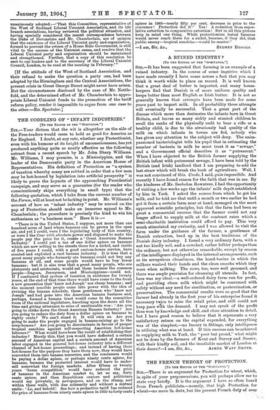THE CODDLING OF "INFANT INDUSTRIES." [To THE EDITOR Op THE
" SPECTATOR:]
Srn,—Your dictum that the wit is altogether on the side of the Free-traders would seem to hold as good for America as for England. I doubt, at any rate, whether any Protectionist, even with his humour at its height of unconsciousness, has yet produced anything quite so neatly effective as the following extract from a recent speech by Mr. John Sharp Williams. Mr. Williams, I may premise, is a Mississippian, and the leader of the Democratic party in the American House of Representatives. His definition of Protection as "a system of taxation whereby many are robbed in order that a few men may be hot-housed by legislation into artificial prosperity" is likely to prove the keynote of the approaching Presidential campaign, and may serve as a guarantee (for the reader who
conscientiously skips everything in small type) that the following quotation, which I take from the current number of the Forum, will at least not be lacking in point. Mr. Williams's account of how an "infant industry" may be nursed on the
pap of Protection should make an immense appeal to Mr. Chamberlain; the procedure is precisely the kind to win his enthusiasm as "a business man." Here it is :—
" There is in the United States, I suppose, not more than one hundred acres of land where bananas can be grown in the open air, and yet I could, were I the legislating body of this country, or were I the Czar with absolute power and disposed to make the people pay the price for it, create a Great American Banana Industry.' I could put a tax of one dollar apiece on bananas which are now selling in the streets three for a nickel, and inside of five years I could, with a good custom-house service, have created and exploited a vast banana industry. It is true that a great many people who formerly ate bananas could not buy any bananas at all, and some people would have to buy fewer bananas ; but it is also true that a great many people, who are plutocrats and aristocrats, would eat them because the common people—Dagoes, Jerseymen, and Mississippians—could not. If I continued that system of taxation in existence for twenty years, at the end of that time there would have come to the front a new generation that 'knew not Joseph' nor cheap bananas ; and the moment sensible people came into power with the idea of revising the banana schedule, these gentlemen who 'knew not Joseph' and had gone into the American banana business and, perhaps, formed a banana trust would come to the committee room of the national legislature, knocking upon the doors all the time and giving utterance to cries of unutterable woo: 'Are you going to strike down the Great American Banana Industry? Are you going to reduce the duty from a dollar apiece on bananas to eighty cents? We can't stand it. It will ruin us. Are you going to make the people engaged in banana-raising go to the soup-houses? Are you going to discriminate in favour of pauper tropical sunshine against self-respecting American hot-house laborers ?' What would have been the result of establishing that industry? Merely this, that you would have deflected a certain amount of American capital and a certain amount of American labor engaged in the general hot-house industry into a different channel of hot-house proceedings ; and instead of having their hot-houses for the purpose they have them now, they would have converted them into banana nurseries, and the consumers would be paying a dollar apiece, or perhaps ninety cents apiece, for bananas, because the protected interest would have to under- sell somewhat the foreign markets. After fifteen or twenty years 'home competition' would have reduced the price of bananas in the American market to, let us say, forty cents apiece, and then Republican orators and politicians would say privately, in newspapers, and on the stump, and within these walls, with due solemnity and without a mutual • Lo, and behold! See how a protective tariff has reduced the price of bananas from ninety cants apiece in 1950 to forty cents apiece in 1965—nearly fifty per cent, decrease in price to the consumer ! Protection did it!' Yes ! A reduction from super- lative extortion to comparative extortion! But in all this picture keep in mind one thing. While protectionism lasted bananas would never reach. three for a nickel, because, if . they did, that public enemy—tropical sunshine—would be master."










































 Previous page
Previous page